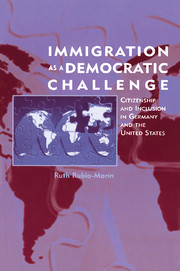Book contents
- Frontmatter
- Contents
- Acknowledgements
- 1 Introduction
- 2 A democratic challenge
- 3 Fair to whom?
- 4 Safeguarding liberal democracy from itself
- 5 Inclusion without consent
- 6 Keeping nationality relevant
- 7 The constitutional debate in the United States
- 8 The constitutional debate in Germany
- 9 Summary and final remarks
- Bibliography
- Index
- Index of Cases
5 - Inclusion without consent
Published online by Cambridge University Press: 22 September 2009
- Frontmatter
- Contents
- Acknowledgements
- 1 Introduction
- 2 A democratic challenge
- 3 Fair to whom?
- 4 Safeguarding liberal democracy from itself
- 5 Inclusion without consent
- 6 Keeping nationality relevant
- 7 The constitutional debate in the United States
- 8 The constitutional debate in Germany
- 9 Summary and final remarks
- Bibliography
- Index
- Index of Cases
Summary
In the previous chapters the inclusion of resident aliens has been discussed in general terms only. No distinction was made between the different categories of resident aliens. It was only required that these be social members. And this merely implied having lived in the country for a number of years, turning it into the centre of one's personal and social experiences. But what about the so-called illegal resident aliens or illegal immigrants? Does their permanent subjection to the law and their being affected by it ultimately trigger their automatic and unconditional inclusion as well? There seems to be a general conviction that it does not. Let us explore why and whether it is morally defensible that this be so.
The exclusion of illegal resident aliens
In principle, if what disturbs our democratic spirits is the long-term coexistence of people with less than equal rights, the inclusion of illegal immigrants can only be more urgent than that of legal aliens. Granted, illegal immigrants are often accorded a whole variety of rights and guarantees. Among them, typically, are the right of access to the courts and appeal against deportation, the right to be treated humanely and usually also some essential social rights, like public education or minimum medical care. After all, we know that in many Western democracies these rights are constitutionally accorded to the person, and not to the citizen. Nevertheless, illegal immigrants' exclusion from civic equality is usually more severe than that of aliens legally residing in the country.
- Type
- Chapter
- Information
- Immigration as a Democratic ChallengeCitizenship and Inclusion in Germany and the United States, pp. 81 - 98Publisher: Cambridge University PressPrint publication year: 2000



